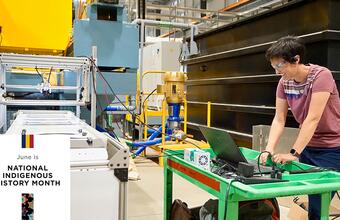
Metallurgy runs in Mary Gallerneault’s family; she only has to point to a portrait in Nicol Hall to prove it. There among rows of photos of grad students is her father, moustached and bespectacled, who also pursued his PhD in Materials Engineering at Queen’s.
“Hopefully that doesn’t point to a lack of imagination on my part,” says Gallerneault with a laugh.
Today, Gallerneault is sitting not far from her dad’s portrait, thinking about the PhD she started in January, and her past. Her grandfather, a Métis man from rural Saskatchewan, also worked in aluminum casting in England after serving in the Second World War.
“He wasn’t an engineer, but if he’d had the same opportunities that my father and I did, I think he would have been,” says Gallerneault.
One of those opportunities is the Indigenous and Black Engineering and Technology (IBET) Momentum Fellowship. Launched in 2021, it provides $30,000 per year for four years, plus mentorship and networking support, to an Indigenous or Black student pursuing a doctoral degree in engineering.
The point of IBET is to help lower systemic barriers faced by these underrepresented students in Canada — and it does that, says Gallerneault, a citizen of the Métis Nation of Ontario and the first Indigenous IBET fellow at Queen’s.
“There’s a gap in representation between Indigenous peoples and the broader Canadian population at academic institutions and in industry as engineers,” she says. “So the fellowship is a really important way to turn that gap into an opportunity and reach people that might not have otherwise felt there was a space at the table for them.”
For Gallerneault, the fellowship funding is significant. Before arriving at Queen’s, she worked in industry for several years, so having that stable source of income makes the transition to academia a lot easier, she says.
The mentoring and networking components are also big, she adds. The IBET program offers fellows funding opportunities to attend conferences as well as pursue research at other IBET institutions. A mentorship program links fellows to professionals in academia and industry from across the country.
Gallerneault plans to pursue the opportunities offered by the fellowship over the next few years. Her main PhD project is a multidisciplinary one integrating big data analysis and machine learning in the manufacturing workflow to optimize processes. In short, she is working on developing a predictive model that will give feedback to production processes in the fields of strip casting and additive manufacturing.
Her interest in all of this might have been sparked by her family’s roots in it, but she says it took off during her undergrad in materials engineering at McMaster University and her MASc in Chemical Engineering at Queen’s. Her industry experience at INVISTA, the National Research Council of Canada, Rivian, and other smaller STEM start-ups also helped.
“It’s one of those things where the more you get exposure to something, the more comfortable you become with it,” she says. “And overall, materials is a fantastic cross-section of science and engineering, and I really enjoy that cross-field type of work.”
Where that interest takes Gallerneault after her PhD is not yet clear, but she certainly has a serious passion for research. Whether that passion takes her further into academia or back to industry, she doesn’t know. For now she is focusing on getting used to academic life again and paying this fellowship forward.
“Early engagement and representation is important, and I want to continue to reach out and support others who might be considering pursuing a degree and career in science and engineering,” she says. “I’ve come to know Melanie Howard and Roberta Bighetty at Indigenous Futures in Engineering, and the important work they do, and other STEM outreach groups at Queen’s, like Let’s Talk Science. I love this type of work, and I hope to continue to share my passion for science and engineering as a way of paying it forward.”
This article originally appeared on the Smith Engineering Website here.
